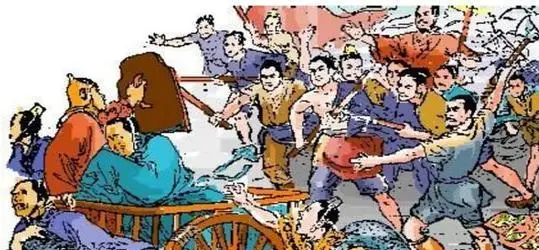Countrymen riot

During the reigns of King Cheng and King Kang, the political situation of the Zhou Dynasty was relatively stable. Afterwards, due to the reduction of exploitation by slave owners and nobles, coupled with continuous wars, the dissatisfaction of civilians and slaves also increased. The rulers of the Zhou Dynasty used extremely harsh punishments to suppress the people. During the reign of King Mu of Zhou, three thousand criminal laws were formulated, and those who violated the law were punished in five ways, known as the "Five Punishments". Like stabbing words on the forehead, cutting the nose, cutting the feet, and so on. However, no matter how severe the punishment is, it cannot stop the people's resistance.
After the tenth king of the Western Zhou Dynasty, King Li of Zhou, ascended to the throne, the oppression of the people became even more severe. King Li of Zhou favored a minister named Rongyi Gong
At that time, farmers living in the wild were called "savages", and civilians living in the capital city were called "countrymen". The countrymen in Haojing, the capital of Zhou Dynasty, were dissatisfied with King Li's cruel measures and were full of complaints.
When the minister Zhao Gonghu heard more and more comments from countrymen, he went into the palace and informed King Li: "The people can't stand it. If the king doesn't change his behavior early, it will be difficult to deal with the trouble."
King Li said indifferently, "Don't worry, I have my own way to deal with it
So he issued an order, forbidding countrymen from criticizing the imperial government. He also asked a wizard from the State of Wei to spy on the people who criticized the imperial government and said, "If you find someone slandering me behind my back, you should report it immediately."
Wei Wu sent a group of people to investigate and listen everywhere in order to please King Li. Those people still extort and blackmail, and anyone who doesn't agree with them will be falsely accused.
King Li believed Wei Wu's report and killed many countrymen. Under such pressure, countrymen really dare not talk in public. People encounter acquaintances on the road, but dare not talk or greet them. They only exchange a glance and hurriedly leave.
King Li was very pleased to see that the number of people criticizing the government in the Wei Wu report was gradually decreasing. Once, when Gong Hu was summoned to meet with King Li, he proudly said, "Look, isn't there anyone discussing this time
Zhao Gonghu sighed and said, "Alas, how can this be done? Blocking people's mouths and preventing them from speaking is even more dangerous than blocking rivers! To control water, it is necessary to dredge the river and let the water flow into the sea; to control a country, it is the same, it is necessary to guide the people to speak. If you forcefully block a river, it will burst; if you forcefully block people's mouths, it will cause great trouble
Li Wang pursed his lips and ignored him, forcing Zhao Gonghu to withdraw.
The tyranny of King Li and Duke Rongyi became more and more severe. Three years later, in 841 BC, countrymen could not bear it, and finally a large-scale uprising was held. The uprising countrymen besieged the palace to kill King Li. When King Li heard the news, he hurriedly led a group of people to flee for their lives. He always escaped across the Yellow River and stopped at swine (pronounced ì, now northeast of Huo County, Shanxi Province).
The countrymen entered the palace and did not find King Li. Someone discovered that Prince Jing of King Li had fled to hide at the home of Zhao Gonghu and surrounded him, demanding that Zhao Gonghu hand over the Crown Prince. Zhao Gonghu had no choice but to impersonate the Crown Prince and send his own son away, in order to protect the Crown Prince.
After King Li left, there was no king in the court. What should we do. After discussion among the ministers, Duke Zhao Hu and another minister, Duke Zhou, presided over a gathering of nobles to temporarily replace the Zhou emperor in exercising their powers, which was historically known as "republican administration". It was not until the first year of the Republic, 841 BC, that Chinese history had a precise chronology.
After fourteen years of republican administration, King Li of Zhou died in swine. The ministers enthroned Crown Prince Ji Jing, who was King Xuan of Zhou. King Xuan was relatively open-minded in politics and received support from the feudal lords. However, after this countrymen uprising, the rulers of the Zhou Dynasty have become superficial and can no longer prosper!
